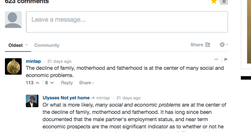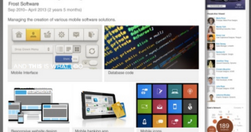Filter 572 resources:
- community (214)
- social media (109)
- comments (94)
- publicsphere (70)
- trust (68)
- media (64)
- news (60)
- participation (58)
- eu (56)
- troll (46)
- ocm (46)
- facebook (43)
- linkedin (41)
- engagement (39)
- disinformation (28)
- groupthink (28)
- blogging (24)
- event (24)
- ai (23)
- content strategy (20)
- psychology (19)
- multilingualism (19)
- democracy (18)
- bloggingportal (17)
- curation (17)
- web20 (17)
- science (16)
- journalism (16)
- medium (16)
- politics (15)
- bloggingportal2 (15)
- communications (15)
- filter bubble (15)
- ai4communities (14)
- crowdsourcing (14)
- bluesky (13)
- blog (13)
- identity (12)
- innovation (12)
- algorithm (12)
- atprotocol (12)
- fediverse (12)
- moderation (11)
- outreach (11)
- twitter (11)
- conversation (11)
- authenticity (11)
- bxlsbbl (10)
- trump (10)
- tool (10)
- europcom (10)
- conspiracy (10)
- storytelling (10)
- cofoe (9)
- science communication (9)
- design (9)
- k4p (9)
- promotion (9)
- us (9)
- english (7)
- cognitive (7)
- metrics (7)
- newsletter (7)
- covid19 (7)
- evidence-based policy (7)
- ec (7)
- collective intelligence (7)
- content (7)
- audience research (7)
- polarization (7)
- bot (7)
- knowledge management (7)
- privacy (6)
- social marketing (6)
- longform (6)
- euractiv (6)
- factchecking (6)
- eurosceptics (6)
- echo chamber (6)
- myhub (6)
- strategy (6)
- management (6)
- data (5)
- semantic (5)
- interactive (5)
- platform (5)
- video (5)
- ewrc2017 (5)
- open web (5)
- propaganda (5)
- web design (5)
- content marketing (5)
- ux (5)
- mastodon (5)
- marketing (5)
- regulation (5)
- influence (5)
- newsroom (5)
- information architecture (5)
- coral (5)
- tribe (5)
- brexit (4)
- google (4)
- drupal (4)
- blogger (4)
- russia (4)
- decentralised (4)
- ep (4)
- brussels bubble (4)
- open source (4)
- audiovisual (4)
- employee engagement (4)
- advertising (4)
- gender (4)
- enewsletter (4)
- usa (4)
- machine translation (4)
- themes (4)
- transparency (4)
- policy (4)
- wikipedia (4)
- attentionweb (3)
- instagram (3)
- qanon (3)
- bullshit (3)
- euroblog (3)
- collaboration (3)
- data journalism (3)
- chatgpt (3)
- podcast (3)
- llm (3)
- pr (3)
- atproto adoption (3)
- blogactiv (3)
- nytimes (3)
- vandenbrande (3)
- realtime (3)
- conference (3)
- game (3)
- internal communications (3)
- culture (3)
- post-truth (3)
- campaign (3)
- censorship (3)
- discourse (3)
- egovernment (3)
- atprotocol lexicon (3)
- search (3)
- native advertising (3)
- science journalism (3)
- hoax (3)
- lobby (3)
- semanticweb (3)
- signal2noise (3)
- mobocracy (2)
- productivity (2)
- blockchain (2)
- digital transformation (2)
- persuasion (2)
- project management (2)
- startup (2)
- reddit (2)
- backfire effect (2)
- nlp (2)
- consultation (2)
- organisation (2)
- business model (2)
- leadership (2)
- guide (2)
- free speech (2)
- augmented reality (2)
- design thinking (2)
- spambot (2)
- optimisation (2)
- debunk (2)
- chat (2)
- hr (2)
- hate (2)
- partisan (2)
- tumblr (2)
- local (2)
- climate (2)
- stream (2)
- online architecture (2)
- fascism (2)
- multimedia (2)
- slack (2)
- copyright (2)
- ft (2)
- mooc (2)
- dao (2)
- smartcities (2)
- future (2)
- europe (2)
- seo (2)
- editorial (2)
- eurosceptic (2)
- river4 (2)
- wiki (2)
- web (2)
- networking (2)
- australia (2)
- europa (2)
- roi (2)
- eci (2)
- survey (2)
- theme (2)
- portal (2)
- expert (2)
- livefyre (2)
- screencast (2)
- governance (2)
- gawker (2)
- eurocrap (2)
- letters2eu (2)
- co-creation (2)
- credibility (2)
- ltinnovate2016 (2)
- indieweb (2)
- substack (2)
- deep fake (2)
- research (2)
- lobbying (2)
- dissonance (2)
- us2020 (2)
- cozyweb (2)
- blogtour (2)
- tools (2)
- euractiv-com (2)
- eparticipation (2)
- learning (2)
- khub (2)
- syndicated-translation (2)
- comment (2)
- canonical debate lab (2)
- threads (2)
- robert putnam (2)
- idpi (2)
- model collapse (2)
- ruben verborgh (2)
- blacksky (2)
- eurosky (2)
- sovereignty (2)
- diig (1)
- hyperknowledge (1)
- massive.wiki (1)
- referendum (1)
- harvest (1)
- monetisation (1)
- cmv (1)
- motivated (1)
- pitch (1)
- spain (1)
- obama (1)
- web development (1)
- email (1)
- twitter migration (1)
- top3pods (1)
- support (1)
- github (1)
- training (1)
- opengov (1)
- digital garden (1)
- dark forest web (1)
- indignation (1)
- data union (1)
- slidecast (1)
- seenthis (1)
- meeting (1)
- egov (1)
- digg (1)
- #ilooklikeanengineer (1)
- disco (1)
- klout (1)
- ssi (1)
- network (1)
- society (1)
- b2b4me (1)
- gdpr (1)
- nasa (1)
- election (1)
- crowdfunding (1)
- logistics (1)
- bloom (1)
- game theory (1)
- technology (1)
- traffic (1)
- agent (1)
- energy (1)
- quit (1)
- responsive (1)
- douglas rushkoff (1)
- photography (1)
- hive (1)
- liveblogging (1)
- corporate journalism (1)
- antiviral (1)
- isismediablackout (1)
- surveillance (1)
- google+ (1)
- experiment (1)
- author (1)
- content partnership (1)
- sensecraft (1)
- big data (1)
- software (1)
- jeff jarvis (1)
- evolution (1)
- free our feeds (1)
- happeningo (1)
- calendar (1)
- anonymity (1)
- joan westenberg (1)
- forum (1)
- ecas (1)
- register (1)
- gpt-4o (1)
- listen (1)
- civil rights (1)
- right (1)
- synthesise (1)
- values (1)
- consultancy (1)
- geo (1)
- faceted search (1)
- nfc (1)
- internet of things (1)
- ibeacon (1)
- convert (1)
- cro (1)
- bbc (1)
- anuj ahooja (1)
- twxplorer (1)
- votewatch (1)
- mep (1)
- profile (1)
- new public (1)
- belgium (1)
- web2.0 (1)
- video_conferencing (1)
- interface (1)
- pluriverse (1)
- ethics (1)
- wikitribune (1)
- risk (1)
- knowledge panel (1)
- cultural exchange (1)
- sentiment analysis (1)
- meme (1)
- vlog (1)
- osmo (1)
- vsop (1)
- learn (1)
- pubhub (1)
- hangout (1)
- ugc (1)
- debatehub (1)
- ep2014 (1)
- stanbol (1)
- apache (1)
- rebut (1)
- meps (1)
- prezi (1)
- epale (1)
- opencalais (1)
- programme (1)
- education (1)
- scale (1)
- pilot (1)
- groupfeel (1)
- eesc (1)
- at4democracy (1)
- nhscitizen (1)
- conform (1)
- eu09vs19 (1)
- evidence (1)
- sortition (1)
- machine learning (1)
- popvox (1)
- micro.blog (1)
- posse (1)
- instant articles (1)
- public affairs (1)
- viral (1)
- interoperability (1)
- presseurop (1)
- geofence (1)
- computational propaganda (1)
- eu2024 (1)
- newsguard (1)
- pluralistic ignorance (1)
- robin berjon (1)
- machine text (1)
- infowar (1)
- apocalypse (1)
- geoengineer (1)
- nz (1)
- grassroots (1)
- wikinews (1)
- antivaxxer (1)
- cocomo (1)
- inscrutable (1)
- rail (1)
- talia stroud (1)
- bundle (1)
- inclusion (1)
- zettelkasten (1)
- infopocalypse (1)
- goodwill (1)
- cancel culture (1)
- eli pariser (1)
- gpt-x (1)
- unreality (1)
- bias (1)
- consent (1)
- stack overflow (1)
- activitypub (1)
- framework (1)
- media literacy (1)
- participatory culture (1)
- solid (1)
- adversarial interoperability (1)
- gab (1)
- blocklist (1)
- planetary (1)
- scuttlebutt (1)
- trust net (1)
- clubhouse (1)
- arg (1)
- floc (1)
- standards (1)
- w3c (1)
- presidency (1)
- dunbar (1)
- creativity (1)
- cambridge analytica (1)
- deletefacebook (1)
- launch (1)
- bluesky custom feeds (1)
- reflections (1)
- eu-treaty-institutions (1)
- eu-priorities-and-opinion (1)
- network effect (1)
- social-media (1)
- publicsectorinformation (1)
- cluetrain (1)
- addiction (1)
- programmes (1)
- information (1)
- rebuttal (1)
- ngo (1)
- truth (1)
- minimalist (1)
- lisp (1)
- yellow-card (1)
- eurosplinternet (1)
- whitewind (1)
- brand (1)
- life-in-belgium (1)
- hungarian (1)
- accreditation (1)
- bryan newbold (1)
- altmetric (1)
- integrate (1)
- open social (1)
- collaborate (1)
- explainer (1)
- virtual reality (1)
- justice-home-affairs (1)
- purity spiral (1)
- nft (1)
- ostrom (1)
- cooperatives (1)
- snapshot (1)
- multisig (1)
- d2d (1)
- knowledge graph (1)
- note (1)
- subconscious (1)
- fotl (1)
- betaworx (1)
- conference report (1)
- gordon brander (1)
- customer support (1)
- law (1)
- milo (1)
- open data (1)
- facebook live (1)
- resilience (1)
- visual (1)
- ideation (1)
- network theory (1)
- edelman (1)
- uk (1)
- crm (1)
- livestream (1)
- clickbait (1)
- sceptic (1)
- pattern language (1)
- religion (1)
- transmedia (1)
- snowfall (1)
- sponsored content (1)
- disruption (1)
- social capital (1)
- paywall (1)
- wisdom (1)
- referrals (1)
- scrollytelling (1)
- magazine (1)
- prototype (1)
- amp (1)
- cor (1)
- city (1)
- plexus (1)
- intimacy (1)
- region (1)
- analytics (1)
- 360video (1)
- ambassador (1)
- newsfeed (1)
- data visualisation (1)
- persona (1)
- cms (1)
- publishing (1)
- filter (1)
- jelly (1)
- data enrichment (1)
- perception (1)
- tourism (1)
- youth (1)
- medicine (1)
- mike masnick (1)
- airbnb (1)
- gtd (1)
- counter speech (1)
- intranet (1)
- messaging (1)
- ma parent (1)
- membership (1)
- vine (1)
- radio (1)
Overview: Online Community Management
Convening a community can be the most powerful communication tactic there is.
Online communities offer enormous opportunities to the right organisation. Community members are far more likely to read your content, think of your organisation, give you feedback, share your content, attend your events, get involved in your programmes, and buy your products.
On the other hand, convening a community is hard: few people have time for more than a couple of online platforms in their lives, so attracting them to yours means you need to be uniquely useful to them.
That generally requires a change of mindset and new internal processes across the organisation, because it’s not your community - it's theirs. And getting their involvement means really listening to what they have to say, and then visibly acting on it.
I built the EU Commission’s first online community in 2002, and have built many more successful ones since. If you’d like to chat, get in touch.
More services: start with Communication strategy.
Relevant resources
Pour le Journée Européenne du blogging multilingue, a video of one minute (waltz) length sur the bloggingportal.eu reboot, avec une "first look" à les wireframes et pas un mot dans mon accent francais de vache espagnol.
It's not strictly necessary to rebrand bloggingportal, but everyone I've spoken to thinks it's a good idea, so why not have a little competition?
Data from bloggingportal.eu, extracted by BrusselsBlogger, gives some idea of the dominance of English as a blogging language on EU policy.

"Knowing who is in your community is key to success for any and all Facebook marketers. Often times who you think is in your community is far different than who really is or who you wish was in your community. As part of Tabsite’s “Get a Grip” Series on Facebook Marketing where we help marketers look at key aspects of their Facebook strategy, thi…

" social marketers mistakenly equate the strength of their community with the size of their following. They establish fans on Facebook, Twitter and other social networks as key performance indicators and then blast them with brand messages. The truth is that the strength of your community has much less to do with how consumers are connected to y…
Some of the comments to my initial post showed me that I have to show, not tell, what I mean when I refer to technologies like semantic analysis and faceted search. So, a quick video about faceted search and the role it could play in helping people find opinions and ideas on EU policy via a rebooted BloggingPortal.
I received a couple of interesting reactions to the post about rebooting BloggingPortal, but as some of them were by email I decided to reply in FAQAO (Frequently Asked Questions And Objections) format, which I just invented, in case others have the same questions.
"“The level of discourse — the difference — was pretty stunning,” Orr said. The people posting through Facebook Comments displayed anger, but it didn’t have to be heavily moderated. “On the articles, it immediately plunged into the lowest common denominator — racism, threats, vulgarity. It was night-and-day.”"

"the new feature ... gives both Gawker authors and readers the ability to filter comments based on the writers and commenters they follow, or whose content they have “liked” or given a star to. So readers can click on Denton’s name and see not only the posts he has written, but also a specific selection of comments that he has chosen to show, from…
As I've mentioned now and then (e.g., BloggingPortal's 3rd birthday, 2012), a desultory conversation amongst Bloggingportal editors dragged on for several years, before dying after it became clear that the lack of decision-making process made it impossible to move forward.
"But even a fractious minority wields enough power to skew a reader's perception of a story, recent research suggests. In one study led by University of Wisconsin-Madison professor Dominique Brossard, 1,183 Americans read a fake blog post on nanotechnology and revealed in survey questions how they felt about the subject (are they wary of the benef…

" Popular Science has officially shut off its comment section, pointing to research showing that disagreeable comments hurt the reading experience. Or, at least, the reading comprehension. One study out of the University of Wisconsin-Madison found that mean comments under an article about nanotechnology "polarized readers," taking attention away f…
"a new kind of reblogging functionality so that readers can top the articles they share with their own headlines and introductions.... “Publishing should be a collaboration between authors and their smartest readers. And at some point the distinction should become meaningless."
"The League of Young Voters in Europe is a politically neutral initiative that aims to amplify young people's concerns and expectations in the run-up to European elections. It's a movement across Europe designed by young people, for young people."
Airbnb presents “Hollywood & Vines.” A first-of-its-kind short film made entirely out of six-second Vines submitted from all over the world. (via Airbnb - Hollywood & Vines)

"what is a Community Manager? Because the term takes on such a broad role, we are going to break down the best practices of Team Hüify Community Managers!"
enter search terms to see snapshot of related activity in the latest 500 tweets. TwXplorer will break down the most common terms, hashtags, and links for you to filter and drill down further." An API would be awesome.

"The MyVote 2014 tool is the latest in a series of tools of this sort ... but this time it’s different in one crucial way: MyVote 2014 uses data about MEPs have voted in the past (between 2009 and now to be precise), and uses this as the data for the tool. This makes the outcomes of the MyVote 2014 tool more solid than previous efforts. Rather tha…

"some solid rules for when it's cool and when it's creepy to contact a journalist. Here are 10 tips on how to pitch a journalist on social media, largely based on the experiences of Mashable's editorial team. "

"The Beginner's Guide to Conversion Rate Optimization (CRO) is an in-depth tutorial designed to help you convert more passive website visitors into active users that engage with your content or purchase your products."

"Beacons are a small wireless sensors placed inside any physical space that transmit data to your iPhone using Bluetooth Low Energy (aka Bluetooth 4.0, Bluetooth Smart). ... Smartphones that are in an iBeacon zone will benefit from personalized microlocation-based notification and actions." - huge potential for conferences, exhibitions, network…
"and the idea was to get academic expertise and research into the broader public conversation."

I won the epale online community of practice project and steered its inception phase. Years later, it is still one of the EC's most successful online communities, notably by its ambitious multilingualism strategy and high userbase, despite lacking any financial rewards for participation.
A while back I was invited to make a 10minute presentation to "Civil Society Day", held at the EESC. Kwinten Lambrecht asked me to upload the ppt, and others asked for followup links, hence this post.
Apparently tomorrow - apart from being Australia Day - is BloggingPortal's 3rd birthday. What does it's state tell us about the EU Online Public Space? How many more friends can I lose anyway?
A recent edition of The Infinite Monkey Cage, BBC Radio4's brilliant chat show combining science and comedy, got me thinking again about the parallels between science communications and EU communications.
At last, an opportunity to blog about gardening and EU comms in the same post.
On November 8, MEPs will discuss '10 concrete political proposals' for creating the European public sphere via digital media, developed by IHECS (Institut des Hautes Etudes des Communications Sociales) and their partners via Socialeuropeanjournalism.com.
Loading more...
